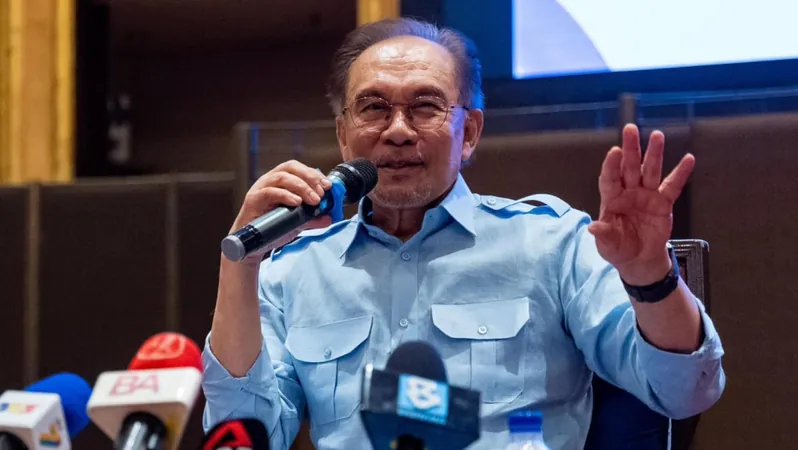
Rising Support for Malaysia's Anwar Ibrahim: A Market Pulse Check at the 2-Year Milestone
2024-12-24
Author: Wei
Rising Support for Malaysia's Anwar Ibrahim: A Market Pulse Check at the 2-Year Milestone
KUALA LUMPUR: Recent survey findings indicate a notable increase in optimism among Malaysians regarding Prime Minister Anwar Ibrahim's leadership and the direction of the country. As we approach the end of November 2024, an independent study conducted by Merdeka Center shows that 39 percent of respondents believe Malaysia is heading in the right direction, a slight rise from 36 percent in November 2023.
The survey, which sampled 1,207 registered voters, highlights an ongoing struggle between positive and negative sentiments surrounding Anwar's tenure. While 53 percent of Malaysians still view the country's trajectory unfavorably, down from 54 percent a year ago, economic worries remain at the forefront of public anxiety.
Interestingly, Anwar's approval rating has also seen an uptick, hitting 54 percent, a modest four-point increase from the previous year. This rebound can be attributed, in part, to improvements in public perception about Malaysia’s international image and foreign investment appeal. The survey indicated that Anwar's government is perceived to foster efficiency and integrity within the civil service, which may be contributing to a more favorable view of his leadership.
Despite these positive shifts, economic issues plague the majority of respondents, with concerns about the cost of living lingering prominently. Merdeka Center co-founder Ibrahim Suffian noted economic pressures as a "persistent" issue, reflecting the realities; although average incomes have seen an improvement post-COVID-19, the rising costs of essentials are making daily life increasingly challenging for many.
On December 22, Anwar provided a summation of his government's economic achievements via social media, highlighting a staggering RM254.7 billion (approximately US$56.7 billion) in approved digital investments within the first nine months of 2024, projected to create 159,000 new jobs. Furthermore, his administration's New Industrial Master Plan 2030 has propelled manufacturing sector growth, showcasing a 4.7 percent rise in added value contributing RM4.2 billion to the domestic gross product.
However, while Anwar's government touts these achievements, survey respondents remain vocal about their dissatisfaction with economic conditions, indicating that despite perceived governmental efforts, many still grapple with inflationary pressures and inadequate income levels. Common frustrations included high living costs and a depreciating ringgit.
The survey results reveal an intriguing contrast in the public's perspective on Anwar’s performance. While he has been criticized for failing to swiftly implement promised reforms, his international engagements on geopolitical issues, such as advocating for Malaysia's full membership in the BRICS and voicing opposition to external conflicts, have resonated well with some voters, reflecting a strong desire for a prominent Malaysian presence on the global stage.
As we reflect on Anwar Ibrahim's two-year mark as Prime Minister, it is clear that despite a complicated economic landscape and lingering public concerns, his administration has made strides in fostering optimism and pushing for growth in unprecedented ways. The shifting sentiments among Malaysians suggest a cautious yet hopeful outlook for their nation’s future—a notable feat in today's turbulent times.





 Brasil (PT)
Brasil (PT)
 Canada (EN)
Canada (EN)
 Chile (ES)
Chile (ES)
 España (ES)
España (ES)
 France (FR)
France (FR)
 Hong Kong (EN)
Hong Kong (EN)
 Italia (IT)
Italia (IT)
 日本 (JA)
日本 (JA)
 Magyarország (HU)
Magyarország (HU)
 Norge (NO)
Norge (NO)
 Polska (PL)
Polska (PL)
 Schweiz (DE)
Schweiz (DE)
 Singapore (EN)
Singapore (EN)
 Sverige (SV)
Sverige (SV)
 Suomi (FI)
Suomi (FI)
 Türkiye (TR)
Türkiye (TR)